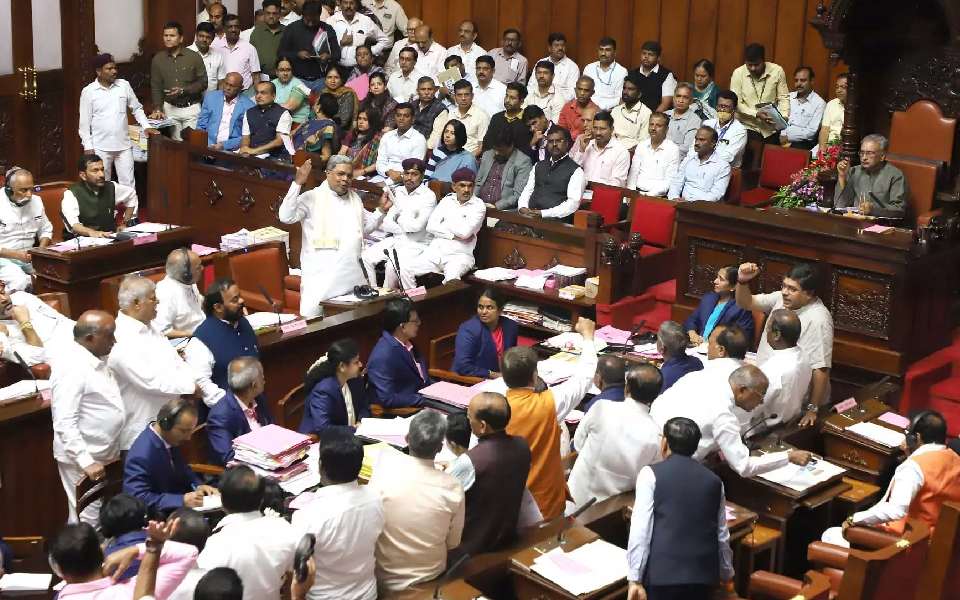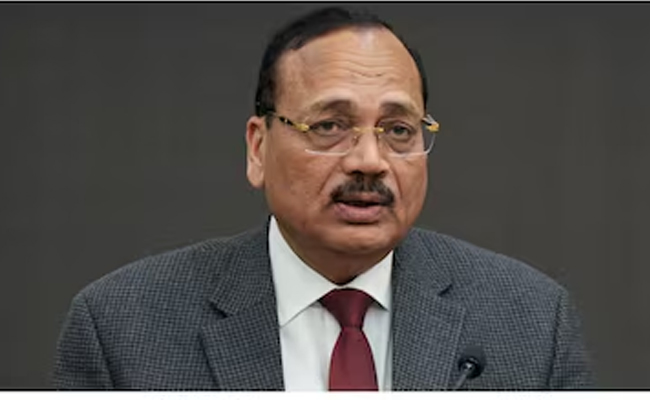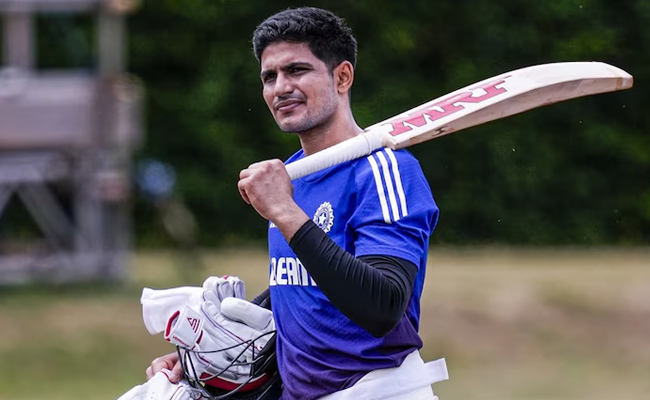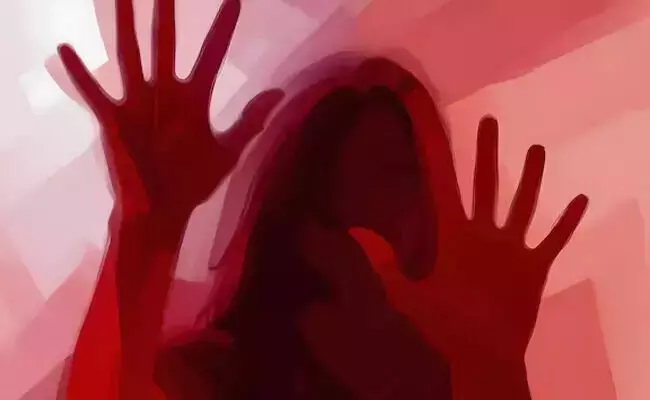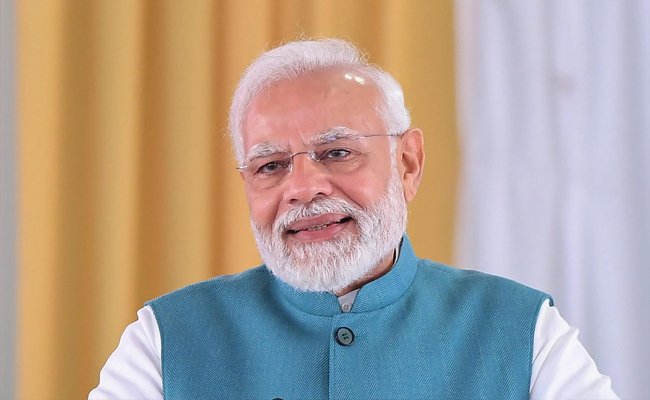New Delhi, Feb 14: Karnataka Chief Minister Siddaramaiah has moved the Supreme Court against a Karnataka High Court order that has dismissed his plea to quash an FIR lodged against him and others in 2022 in relation to a protest march.
The Congress leader has challenged the February 6 order of the high court that has imposed a fine of Rs 10,000 on him as well as Congress general secretary and Karnataka in-charge Randeep Singh Surjewala, state ministers M B Patil and Ramalinga Reddy, and directed him to appear before a special court on March 6.
The case was registered against the Congress leaders after they took out a march to lay siege to the then chief minister Basavaraj Bommai's residence in Bengaluru, demanding the resignation of K S Eshwarappa, who was the rural development and panchayat raj minister in the southern state at the time.
The agitation was staged after a contractor, Santosh Patil, died by suicide accusing Eshwarappa of demanding 40 per cent commission on a public work in his village.
ALSO READ: BJP MLA K Gopalaiah alleges death threats from Bengaluru ex-Corporator, demands protection
According to police, the case pertained to blocking roads and causing trouble to commuters.
Stating that none of the "quintessential" ingredients of the offences alleged was made out, Siddaramaiah has said in his plea that the proceedings are an abuse of the process of law and would lead to undue harassment.
"The incident complained lasted for almost an hour and no violent action or use of criminal force has been alleged against any of the members of the procession, it is thus submitted that the prosecution cannot be allowed to continue on such frivolous incidents where no allegation of criminality has been attributed to any of the members of the assembly," the plea says.
In his plea before the top court, Siddaramaiah has said there is no allegation that the protest led to any violence or use of criminal force to pose an imminent threat to the public at large or to anyone, including the minister.
Let the Truth be known. If you read VB and like VB, please be a VB Supporter and Help us deliver the Truth to one and all.
Jaisalmer (PTI): Pushing for a "unified judicial policy", Chief Justice of India Surya Kant on Saturday said technology can help align standards and practices across courts, creating a "seamless experience" for citizens, regardless of their location.
He said high courts -- due to the federal structure -- have had their own practices and technological capacities, and "regional barriers" can be broken down with technology to create a more unified judicial ecosystem.
Delivering the keynote address at the West Zone Regional Conference in Jaisalmer, Kant proposed the idea of a "national judicial ecosystem" and called for an overhaul of India's judicial system with the integration of technology.
"Today, as technology reduces geographical barriers and enables convergence, it invites us to think of justice not as regional systems operating in parallel, but as one national ecosystem with shared standards, seamless interfaces, and coordinated goals," he said.
He emphasised how the role of technology in the judiciary has evolved over time.
"Technology is no longer merely an administrative convenience. It has evolved into a constitutional instrument that strengthens equality before the law, expands access to justice, and enhances institutional efficiency," he said, highlighting how digital tools can bridge gaps in the judicial system.
Kant pointed out that technology enables the judiciary to overcome the limitations of physical distance and bureaucratic hurdles.
"It allows the judiciary to transcend physical barriers and bureaucratic rigidities to deliver outcomes that are timely, transparent and principled," he said, adding that the effective use of technology can modernise the delivery of justice and make it more accessible to citizens across the country.
The CJI called for implementing a "unified judicial policy".
He said India's judicial system has long been shaped by its federal structure, and different high courts have their own practices and technological capacities.
"India's vast diversity has led to different high courts evolving their own practices, administrative priorities and technological capacities. This variation, though natural in a federal democracy, has resulted in uneven experiences for litigants across the country," he said.
Kant underscored that predictability is crucial for building trust in the judicial system.
"A core expectation citizens place upon the courts is predictability," he said, adding that citizens should not only expect fair treatment but also consistency in how cases are handled across the country.
He pointed to the potential of technology in improving predictability.
"Technology enables us to track systemic delays and make problems visible rather than concealed," he said.
By identifying areas where delays occur, such as in bail matters or cases involving certain types of disputes, courts can take targeted action to address these issues and improve efficiency, Kant said.
The CJI explained that data-driven tools could identify the reasons behind delays or bottlenecks, allowing for faster, more focused solutions.
"Technology enables prioritisation by flagging sensitive case categories, monitoring pendency in real time and ensuring transparent listing protocols," he said.
Justice Surya Kant also discussed the importance of prioritising urgent cases where delays could result in significant harm. He highlighted his recent administrative order that ensures urgent cases, such as bail petitions or habeas corpus cases, are listed within two days of curing defects.
"Where delay causes deep harm, the system must respond with urgency," he stated, explaining that technology can help courts identify and expedite such cases.
Kant also raised the issue of the clarity of judicial decisions.
He noted that many litigants, despite winning cases, often struggle to understand the terms of their judgment due to complex legal language.
"Although the orders had gone in their favour, they remained unsure of what relief they had actually secured because the language was too technical, vague or evasive to understand," he said.
He advocated for more uniformity in how judgments are written.
"A unified judicial approach must therefore extend to how we communicate outcomes," he said.
The CJI also discussed the role of AI and digital tools in improving case management. He pointed to the potential of AI-based research assistants and digital case management systems to streamline judicial processes.
"Emerging technological tools are now capable of performing once-unthinkable functions. They can highlight missing precedent references, cluster similar legal questions, and simplify factual narration," he said, explaining how these technologies can help judges make more consistent decisions.
He also highlighted tools like the National Judicial Data Grid and e-courts, which are already helping to standardise processes like case filings and tracking.
Kant reiterated that the integration of technology into the judicial process is not just about improving efficiency but about upholding the integrity of the system and strengthening public trust.
"The measure of innovation is not the complexity of the software we deploy, but the simplicity with which a citizen understands the outcome of their case and believes that justice has been served," he said.

